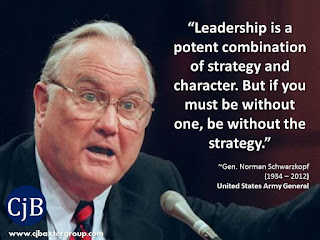Character - Essential in Leadership and Management
Mel Fonollera, blogger
What are today's millennial managers' thoughts on the importance of "Character" in leadership and management? Do they really understand the significance of character concerning their role as managers?
I had a chance to see their perspective on this when I gave a one-day training to "millennial" supervisors and managers about leadership and management development last July 22. Almost all agree that character is important. It was also a great opportunity to present the merits of Character to this younger generation of managers.
When I was doing the outline for the training I asked myself - "What would be the contents of my training that would benefit them the most?" There were so many choices, so I decided to look into how military academies develop young men to become leaders; because these future leaders will face the most challenging and stressful situations imaginable for leadership.
I saw a common thread between West Point and the Philippine Military Academy. They anchor their leadership development program foremost on "character" followed by "competence."
What are today's millennial managers' thoughts on the importance of "Character" in leadership and management? Do they really understand the significance of character concerning their role as managers?
I had a chance to see their perspective on this when I gave a one-day training to "millennial" supervisors and managers about leadership and management development last July 22. Almost all agree that character is important. It was also a great opportunity to present the merits of Character to this younger generation of managers.
When I was doing the outline for the training I asked myself - "What would be the contents of my training that would benefit them the most?" There were so many choices, so I decided to look into how military academies develop young men to become leaders; because these future leaders will face the most challenging and stressful situations imaginable for leadership.
I saw a common thread between West Point and the Philippine Military Academy. They anchor their leadership development program foremost on "character" followed by "competence."
I then looked deeper at Character and I saw a whole ocean of thought about this subject. There were quotes from the famous military, political, sports, and business leaders from the past centuries up to this century. They all shared the idea that character is important for leaders; because followers are inspired by their leader's character.
In my desire to fully understand character there were a lot of definitions and it became very confusing. To narrow it down, I found out that character - is a lifetime development process; it's both nature and nurture; it's a combination of traits that is easily viewed by others; it does not happen in a vacuum; it should be a conscious choice otherwise the sub-conscious will choose it for you. More importantly, it will ensure success for leaders.
I also found an interesting formula for character development:
There are a lot of virtues. There are the Stoic virtues; Benjamin Franklin's 13 virtues; universal virtues; virtues found in different cultures; religious virtues; etc. In one online source, there are more or less 50 virtues. With all these virtues it's difficult to zero in on what are the essential virtues for leadership and management.
Another question that popped up into my mind was - "Which among the virtues are needed to form into habits that will build character to make an effective leader and manager?" There's too many. Does it require that all the virtues should be practiced? I needed to get a practical answer.
Again, I re-examined the military academies and in one particular case - the Philippine Military Academy focused on three main virtues which are Courage, Integrity, and Loyalty. For a practical reason, the military academies chose courage as one of the virtues because combat leaders obviously cannot lead men into battle if the leader is a coward. That being the case, I concluded that character traits are situational.
In the corporate world, I theorized that there are significant character traits required for leadership and management in certain positions and in different companies. To test my hypothesis, during the training, I asked a question to the participants - "What character traits are needed in their respective positions as managers in their company?"
To have a common basis for the participants to answer the question, I used an online source where virtues across cultures, faiths, and time period were summarized into 24 common character strengths. It was further classified into six main virtues. The classification of character strengths was developed by two eminent psychologists Christopher Peterson and Martin Selegman, which they referred to as "Values in Action Inventory (VAI)."
The answers were varied maybe because of the position level in the management hierarchy they hold and the respective function they perform. I presumed that they were in a better position to define which virtues are needed.
The VAI was a big help to the participants in providing focus to essential virtues for leaders to develop their character. The best part is there's a website where one can take an online character assessment using the VAI to see what one's character strengths are. All one has to do is answer all the questions which will take about 15 minutes. It will reveal all 24 character strengths arranged in ascending order but with the first being the strongest.
The psychologists who developed the VAI noted that all of us display the 24 character strengths but in varying degrees. The 24 character strengths though included leadership as a specific character strength; so this was a given in my question to the participants.
The online assessment was a big help to participants because it gave them a sense of the different degrees of their character strengths. However, if the assessment revealed among the participants that essential traits needed for leadership are in the bottom rung; they need to work on those virtues.
To have a common basis for the participants to answer the question, I used an online source where virtues across cultures, faiths, and time period were summarized into 24 common character strengths. It was further classified into six main virtues. The classification of character strengths was developed by two eminent psychologists Christopher Peterson and Martin Selegman, which they referred to as "Values in Action Inventory (VAI)."
The answers were varied maybe because of the position level in the management hierarchy they hold and the respective function they perform. I presumed that they were in a better position to define which virtues are needed.
The VAI was a big help to the participants in providing focus to essential virtues for leaders to develop their character. The best part is there's a website where one can take an online character assessment using the VAI to see what one's character strengths are. All one has to do is answer all the questions which will take about 15 minutes. It will reveal all 24 character strengths arranged in ascending order but with the first being the strongest.
The psychologists who developed the VAI noted that all of us display the 24 character strengths but in varying degrees. The 24 character strengths though included leadership as a specific character strength; so this was a given in my question to the participants.
The online assessment was a big help to participants because it gave them a sense of the different degrees of their character strengths. However, if the assessment revealed among the participants that essential traits needed for leadership are in the bottom rung; they need to work on those virtues.
Well, I did mine and felt that the results were nearly actual representations of my character strengths. So I was able to identify the strongest virtues and saw the other virtues that I needed to work on in my particular stage in life. The assessment will simply guide me to capitalize on my strengths and work on the others. There's no need to reinvent Character. It's just being clear on what virtues are needed and work on the least ones if these are essential virtues; and again it's situational.
To cap the training, it required a personal leadership and management values statement to actualize and form into habits the virtues needed to develop the ideal character traits for managers.
It would be much better if companies do have a written core values statement that supports the company's vision-mission statement. That way managers will explicitly be guided on which virtues to uphold in their respective positions and among their subordinates. This would definitely foster the required character strengths from their managers.
It would be much better if companies do have a written core values statement that supports the company's vision-mission statement. That way managers will explicitly be guided on which virtues to uphold in their respective positions and among their subordinates. This would definitely foster the required character strengths from their managers.





Comments
Post a Comment